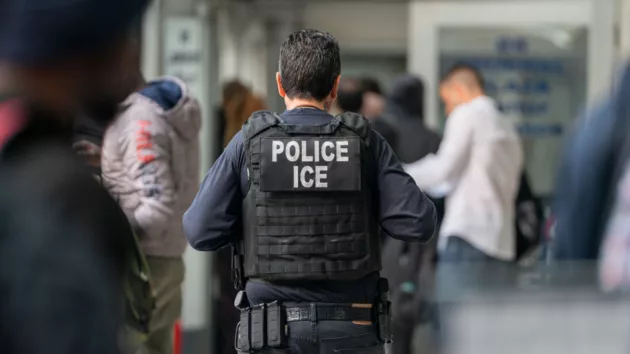
(DALLAS) — The immigration cases of some of the Venezuelan migrants who were deported to El Salvador under the Alien Enemies Act in March have been dismissed, their attorneys said, raising concern from advocates and lawyers who say the move is a violation of due process.
For more than two months, John Dutton, a Houston-based immigration attorney, fought to keep one of his client’s immigration case open. Henrry Albornoz Quintero, who was detained in Dallas in January after showing up to a routine check-in with Immigration and Customs Enforcement, was deported to the notorious CECOT prison in El Salvador in March.
After Quintero was deported, Dutton continued to show up to his client’s immigration hearings where he says the government attorneys declined to answer questions about his client and pushed for dismissal. Quintero’s case was dismissed “due to a lack of jurisdiction,” Dutton said.
“There’s just nothing [the judge] could do,” Dutton said. “Henrry is not here because the president shipped him out of the country. What’s an immigration judge going to do to stop that?”
Dutton previously told ABC News that Quintero’s wife, who entered the U.S. with him last year, had a baby in April.
Michelle Brane, the executive director of the immigration support group Together and Free, told ABC News that her team has tracked at least 15 immigration cases of migrants who were sent to CECOT that were recently dismissed. Some of the cases include active pending asylum applications.
Brane said she believes immigration courts should “administratively close” the cases, which would allow them to be reopened “if and when” the person is brought back.
“Dismissing as opposed to administratively closing is sort of making an assumption that these people will never come back,” Brane said. “And I think that’s premature and certainly based on the court decisions, so far, they should be brought back to receive some kind of due process.”
If the Venezuelan migrants were to be brought back, there is no process for reopening their immigration cases, Brane said.
The Department of Homeland Security did not respond to ABC News’ request for comment.
Mark Prada, an attorney representing a 24-year-old Venezuelan, said he was able to have his client’s case administratively closed.
“I was able to cut the head off the snake before it could poke out of its hole,” he told ABC News.
Isabel Carlota Roby, an attorney for the Robert F. Kennedy Human Rights organization, told ABC News that at least seven of the 10 men her group represents had some form of legal protection in the U.S., including Temporary Protected Status or pending asylum applications before being deported to CECOT in El Salvador.
Roby said her group represents them internationally — filing habeus petitions in El Salvador and other types of advocacy — but does not represent them in U.S. immigration court. However, she said many of them have had their cases dismissed recently. She told ABC News that most of the migrants her group represents do not have immigration attorneys.
“They basically represented themselves in court and presented their own asylum cases,” Carlota Roby said. “Most of them simply were deported and their cases were just left behind and that was it.”
“They were denied due process, they are disappeared, and they are now in this legal limbo where they remain in a prison with no legal protections, excluded from the protection of the law, and they don’t know if they’ll ever have a chance at a fair trial,” she added.
The Trump administration invoked the Alien Enemies Act — an 18th century wartime authority used to remove noncitizens with little-to-no due process — to deport more than 200 alleged migrant gang members to CECOT by arguing that the Venezuelan gang Tren de Aragua is a “hybrid criminal state” that is invading the United States.
An official with the ICE acknowledged that “many” of the men deported on March 15 lack criminal records in the United States — but said that “the lack of specific information about each individual actually highlights the risk they pose.” Many of their families have also denied gang involvement.
The government is temporarily barred from removing migrants under the proclamation after the Supreme Court extended its injunction last month and remanded the case to the 5th U.S. Circuit Court of Appeals to resolve the question of how much time should be afforded for detainees to contest their removals.
Some attorneys told ABC News they are appealing the dismissals.
The lawyer for Jose Franco Caraballo Tiapa, a 26-year-old Venezuelan migrant who was seeking asylum in the U.S., and was detained after showing up to his routine check-in with ICE, filed an appeal after his client’s case was dismissed.
“The dismissal results in what can be construed as a violation of due process, as he was not given the opportunity to be heard on his asylum claim,” said Martin Rosenow.
Lindsay Toczylowski, the attorney who represents Andry Hernandez Romero, a gay makeup artist who was sent to CECOT in El Salvador, said in a statement that her client was denied due process.
“DHS is doing everything it can to erase the fact that Andry came to the United States seeking asylum and he was denied due process as required by our Constitution,” Toczylowski said. “The idea that the government can disappear you because of your tattoos, and never even give you a day in court, should send a chill down the spine of every American.”
In the statement posted by Immigrant Defenders Law Center, the group said the dismissal of Hernandez’s dismissal is “not the end.” The group said it will file an appeal and continue its advocacy to bring the 32-year-old back to the U.S.
Copyright © 2025, ABC Audio. All rights reserved.








